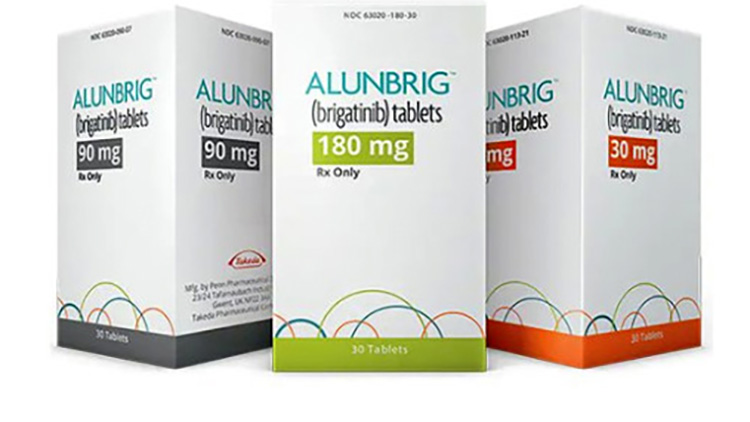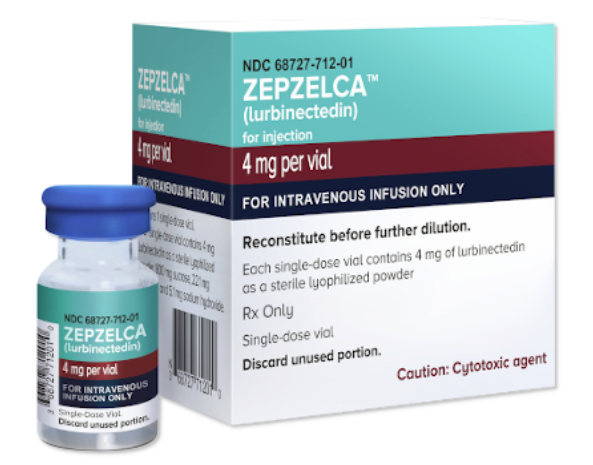Alunbrig (brigatinib) vs Zepzelca (lurbinectedin)
Alunbrig (brigatinib) vs Zepzelca (lurbinectedin)
Alunbrig (brigatinib) is a targeted therapy known as a tyrosine kinase inhibitor, specifically designed to treat non-small cell lung cancer (NSCLC) with a type of abnormal anaplastic lymphoma kinase (ALK) gene, and is used after crizotinib has stopped working. Zepzelca (lurbinectedin), on the other hand, is a newer type of chemotherapy that works by interfering with the transcription process in cancer cells, and it is approved for the treatment of metastatic small cell lung cancer (SCLC) after prior platinum-based chemotherapy has failed. When deciding between Alunbrig and Zepzelca, the type of lung cancer (NSCLC with ALK mutations for Alunbrig, versus SCLC for Zepzelca), previous treatments, and the specific genetic mutations present in the cancer cells are critical factors to consider in consultation with a healthcare provider.
Difference between Alunbrig and Zepzelca
| Metric | Alunbrig (brigatinib) | Zepzelca (lurbinectedin) |
|---|---|---|
| Generic name | Brigatinib | Lurbinectedin |
| Indications | Non-small cell lung cancer (NSCLC) | Small cell lung cancer (SCLC) |
| Mechanism of action | ALK inhibitor | Alkylating agent |
| Brand names | Alunbrig | Zepzelca |
| Administrative route | Oral | Intravenous |
| Side effects | Nausea, diarrhea, fatigue, cough, headache | Fatigue, nausea, decreased appetite, constipation, respiratory infection |
| Contraindications | Hypersensitivity to brigatinib, severe hepatic impairment | Hypersensitivity to lurbinectedin, severe hepatic or renal impairment |
| Drug class | Tyrosine kinase inhibitor | Tetrahydroisoquinoline alkaloid |
| Manufacturer | Takeda Oncology | Pharma Mar |
Efficacy
Alunbrig (brigatinib) Efficacy in Lung Cancer
Alunbrig (brigatinib) is a targeted therapy approved for the treatment of non-small cell lung cancer (NSCLC) with a specific genetic alteration known as anaplastic lymphoma kinase (ALK) positive. The efficacy of Alunbrig in this patient population has been demonstrated in several clinical trials. For instance, the phase 2 ALTA trial reported that patients with ALK-positive NSCLC who had progressed on crizotinib, an earlier ALK inhibitor, achieved a confirmed objective response rate (ORR) of 45% with the 90 mg once-daily regimen and 54% with the 180 mg once-daily regimen following a 7-day lead-in at 90 mg. Progression-free survival (PFS) was also significantly extended in patients treated with Alunbrig, indicating its effectiveness in this setting.
Furthermore, the phase 3 ALTA-1L trial evaluated the efficacy of Alunbrig as a first-line treatment in patients with ALK-positive NSCLC. The results showed that Alunbrig significantly improved PFS compared to crizotinib, with a hazard ratio of 0.49, indicating a 51% reduction in the risk of disease progression or death. The ORR was also higher in the Alunbrig group compared to the crizotinib group. These findings suggest that Alunbrig is a highly effective treatment option for patients with ALK-positive NSCLC, both as a first-line and subsequent therapy.
Zepzelca (lurbinectedin) Efficacy in Lung Cancer
Zepzelca (lurbinectedin) is a newer chemotherapeutic agent that has shown efficacy in the treatment of small cell lung cancer (SCLC). It functions by binding to DNA and inhibiting oncogenic transcription, leading to cell death. The approval of lurbinectedin for the treatment of SCLC was based on the results of a multicenter, single-arm, open-label phase 2 study. In this study, patients with SCLC who had progressed after platinum-based chemotherapy received lurbinectedin, resulting in a reported ORR of 35% as assessed by an Independent Review Committee (IRC). The median duration of response was 5.3 months, indicating that lurbinectedin provides a meaningful clinical benefit in this patient population.
While the data on lurbinectedin is promising, it is important to note that the approval was granted under the FDA's accelerated approval program based on ORR and duration of response. Continued approval for this indication may be contingent upon verification and description of clinical benefit in confirmatory trials. However, the current evidence positions Zepzelca as a valuable treatment option for patients with SCLC who have limited options after first-line therapy.
Regulatory Agency Approvals
Alunbrig
-
European Medical Agency (EMA), European Union

-
Food and Drug Administration (FDA), USA

-
Pharmaceuticals and Medical Devices Agency (PMDA), Japan

Zepzelca
-
Food and Drug Administration (FDA), USA

Access Alunbrig or Zepzelca today
If Alunbrig or Zepzelca are not approved or available in your country (e.g. due to supply issues), you can access them via Everyone.org.
How it works

Make an enquiry
Choose the medicine you want to buy, answer a couple of questions, and upload your prescription to speed things up. We’ll get back to you within 24 hours.


Make an enquiry
Choose the medicine you want to buy, answer a couple of questions, and upload your prescription to speed things up. We’ll get back to you within 24 hours.


Breeze through the paperwork
We'll guide you through the required documents for importing unapproved medicine, ensuring you have all the necessary information.


Get a personalized quote
We’ll prepare a quote for you, including medicine costs and any shipping, administrative, or import fees that may apply.


Receive your medicine
Accept the quote and we’ll handle the rest - sourcing and safely delivering your medicine.

Some text on this page has been automatically generated. Speak to your physician before you start a new treatment or medication.
Let's talk
If you have any questions, call us or send us a message through WhatsApp or email:
Contact us




